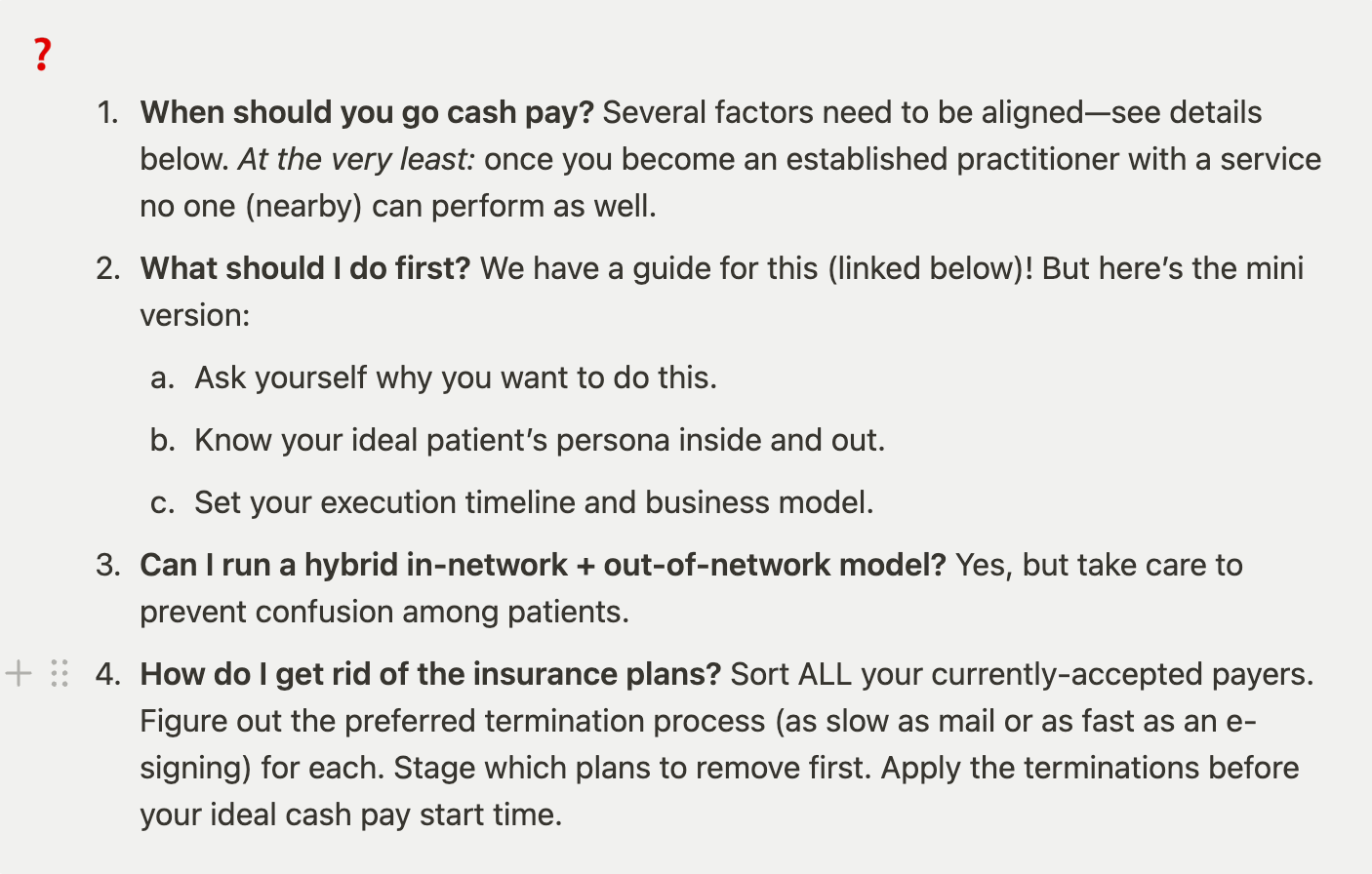Raising the Sails—FAQs of private pay medicine, part I
“It is better to know some of the questions than all of the answers.”
-James Thurber
It might appear straightforward, on paper, to go cash pay, but there are many considerations. These questions matter to patients just as much as physicians. For today, let’s start with four questions that we get asked often. There will be future FAQs in this series. Read on!
Today’s TLDR: our four most common FAQs
1. When is a good time to make the leap to cash pay?
There isn’t a perfect moment so much as a catalyst. That catalyst needs a few prerequisites. A doctor considering cash pay should already have a loyal patient following and solid reputation. Then of course there is some necessary planning ahead of time (see more details below). All staff need to be 100% on the same page. Let your entire team be great advocates for the clinic. Learning if you can’t transition to cash pay at the moment is crucial as well.
It’s not ideal to become a cash pay doctor when you’re a fresh-off-the-boat resident. Another challenge may be that you don’t have a special interest difficult for others to replicate. There are vanishingly few exceptions. Sometimes new residents join a cash pay group out of the gate.
Sometimes a tipping point happens. A doctor’s once-passing thought to go cash pay can rush to the forefront. Physicians getting too fed up with medicine’s current incentives might go cash pay in a live-or-die scenario for their practice.
2. If I want to start a cash pay clinic, what should I do first?
There should be clarity on 1) why you want to pursue direct care medicine and 2) what personas of patients you wish to see. Only then can 3) timeline and 4) business models come into play.
Of course, there’s a little survivorship bias on our part here. Not every clinic successfully begins a direct care model. Hence, use the elements most applicable to your speciality and location. Ditch the rest and make adjustments.
If you live in an area where other doctors started a proper cash pay clinic, flex your networking muscles. Why reinvent the wheel? Specialty isn’t critical at first, but if you’re an internist and you’ve heard of another internist running a direct care practice in your town, make contact. Inquire about how they got started and what worked (and failed).
I’m happy to give you practice-specific pointers as well. I started a cash pay dermatology clinic in 2019 and learned a thing or two along the way. Please feel free to reach me on this Substack or @caretocash on x.com.
3. Can I run a hybrid system (i.e. accept a few health plans and reject others?)
Sure! It’s normal for most practices to mix insurance-first and cash-first patients. However, be careful with your health plan contracts. If you accept one type of UnitedHealthcare PPO but not another, that’s okay. But UnitedHealth Group has almost countless policy variations. That could be a potential source of confusion—if patients look you up on a health plan’s provider directory, and said directory is out of date (which, in my experience, is often), the conversation gets harder.
For any hybrid setup, establish a global view of exactly what plans you accept and don’t accept. Worst-case scenario, your team can use good old Excel to track this—especially if your EMR system is too complex. Ideally, when patients ask if your clinic accepts XYZ health plan (and you run an insurance-first office), your manager should easily give a “yes,” “no,” or “yes, but.” Any other response is unacceptable.
4. How do I leave the health plans?
There are a few steps, but in essence, follow each insurer’s preferred termination process. It could be a simple phone call or fax. Or there may be paperwork more complex than signing onto the plan in the first place. Always get a confirmation and effective termination date regardless of method.
Some plans have mandatory cool-off periods forcing you to delay termination longer. Make sure the effective dates align with your cash pay start time. Double and triple check your health plan contract terms. There might be notice periods or other conditions to adhere to. Don’t tell the patients you’re leaving Aetna’s network in a month if the contract is still in force till next year.
We’ll have a detailed guide for these steps published within a few weeks.
That’s enough questions for today. Don’t worry, there will be more FAQs. Reach us on our Substack or contact me directly @caretocash on x.com to address your practice’s needs.







